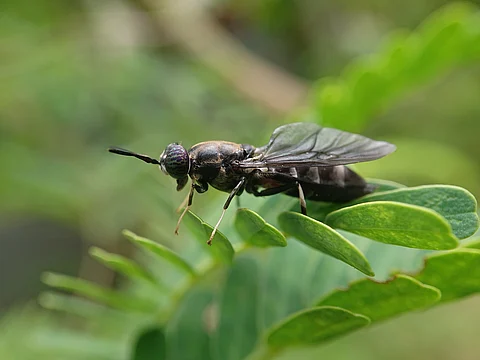Black soldier fly (Hermetia illucens)
Photo: Adobe Stock.
S2G and Ocean 14 Capital back Colombian insect protein producer Enthos
Investment firm S2G Investments and €201 million blue economy impact fund Ocean 14 Capital Fund I have announced a joint investment in Enthos Circular Feed Technologies, a company focused on converting organic waste into insect-based protein and oils for the animal and aquaculture feed industries.
The investment, the financial details of which have not as yet been disclosed, will support the development of Enthos 1, a commercial-scale facility in Colombia designed to become one of Latin America’s largest insect protein plants.
Using Black Soldier Fly (BSF) larvae to upcycle food waste, Enthos produces high-protein insect meal, oils, and organic fertilizer. The process is designed to operate with a significantly lower environmental footprint than traditional protein production and provides a consistent, locally sourced feed ingredient that can reduce dependency on marine ingredients, the investors said.
“From our point of view, insect meal produced by Enthos is a key alternative to the fishmeal used in aquaculture, with aquafeed remaining one of the largest applications of fishmeal globally,” said Piers Lakin, Principal at Ocean 14 Capital Ltd., in a press announcement where he highlighted recent research showing as much as 70% of fishmeal and 73% of fish oil are currently used for aquaculture feed.
“As fishmeal is a limited resource with production volumes subject to environmental fluctuations its use as the sole protein source for fish production is not a sustainable option either economically or environmentally, so we see insect protein as an integral part of a portfolio of alternative proteins that we see reducing the reliance on fishmeal and fish oil," Lakin added.
Tackling food waste as well as ocean sustainability
“Enthos stood out to us for its ability to turn waste into a high-value asset that fits seamlessly into global food and feed markets,” said Larsen Mettler, Managing Director at S2G. “With existing demand from aquaculture and livestock producers, we believe they’re demonstrating that insect protein is a commercially viable, climate-aligned solution.”
The investors point out that the insect protein sector is expanding rapidly. The global market was valued at $1.01 billion in 2023 and is expected to grow at a compound annual growth rate of 16% through 2032, reaching $4.09 billion, driven by both sustainability needs and rising demand for alternative protein sources for livestock farming and aquaculture.
Insect protein production has the further benefit of addressing the enormous global problem of food waste, with more than $1 trillion worth of food discarded annually, the investors pointed out.
"Diverting 1% of global food waste to Black Soldier Fly production could yield an estimated 332,000 metric tonnes of protein annually and one million metric tonnes of organic fertiliser, requiring minimal resources compared to traditional livestock and generating significantly lower greenhouse gas emissions," they stated, announcing the investment.
“Turning organic waste into high value protein and oils has the triple benefit of sustainably feeding more people, reducing ever-growing organic waste volumes and lowering methane volumes emitted from landfills,” said Andreas Grimminger, CEO and Co-Founder at Enthos. “The Black Soldier Fly larvae are ferocious consumers of food waste and grow over 200 times in a feeding period of 15 days," he explained.


